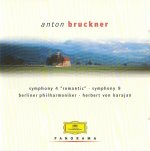Double CD packages involving Bruckner’s “Romantic” symphony usually pair it with No. 7. Panorama has reissued Herbert von Karajan’s 1975 Berlin Fourth along with his 1976 recording of No. 9, giving this bargain set an advantage if you’re out to widen perspectives at minimal cost. Karajan used the 1880 Haas edition of Symphony No. 4 in this performance. It’s more heroic, possibly, but considerably less subtle in its treatment of finer details than either Böhm’s or Jochum’s traversals. Newcomers won’t find these drawbacks overly significant given the tremendous power and structural clarity Karajan brought to the symphony, but his 1970 EMI recording was better.
A key area of concern is the beginning. Jochum’s 1965 opening tremolando in the strings has a breath-catching hush about it. Karajan’s more matter-of-fact DG account starts at levels considerably above Jochum’s heart-stoppingly expectant pppp, so his solo horn player is forced to compensate, losing the mystery of the moment in the process. Panorama’s new transfer alters internal balances somewhat; the cellos’ counter-theme in the second subject group sounds too loud compared to Jochum’s, and some important wind interjections (like birdsong references) recede into the background when they really need to be properly audible. Karajan drives the music forward powerfully in the development section, however, and the Berlin brass choir’s legato playing (here and in the coda) is magnificent. The cellos are still too loud at the start of the slow movement (in this transfer anyway) where Böhm achieves better balance, with more idiomatic responses from the winds, too. Karajan manages the scherzo and finale superbly, and the brass are better differentiated in timbre than on previous issues.
Karajan’s 1976 account of Symphony No. 9 (like his live Mahler Ninth and his final Vienna Philharmonic Bruckner Eight, his last recording) is one of his greatest interpretations. Masterfully controlled, fiery, and eloquent, this reading is among the most moving in the catalog, perhaps equalled only by Günter Wand’s more recent live RCA version with the same orchestra. A minor caveat concerns Karajan’s rather heavy-handed and mannered treatment of a few passages in the finale, but that’s about all he gets wrong here. To summarize: there are better Fourths, but this new transfer offers a somewhat different slant on the performance, and the Ninth is marvelous. Not a bad package, all in all.
































